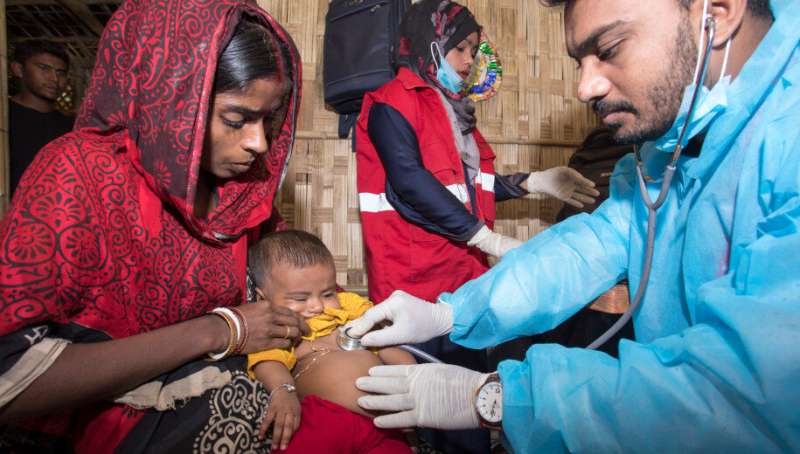Child development plan targets gamut of risks

Child development can be vastly improved by providing pregnant women and caregivers of children with an integrated intervention that consists of improved water, sanitation, hygiene (WASH), nutrition, mental health care and lead exposure prevention, says a study conducted in Bangladesh.
Published this March in BMJ Global Health, the study noted that children in low- and middle-income countries (LMICs) face a substantially increased risk of delayed development. "An estimated one-third of three-year-old and four-year-old children in LMICs—80.8 million children in total—did not meet basic developmental milestones in 2010," it stated.
In the early life of children, factors promoting development include responsive caregiving, nutrition of mother and child, caregiver's mental health, exposure to opportunities for early learning and avoidance of infection, the study observed.
Helen Pitchik, first author of the study and Ph.D. candidate at the School of Public Health, University of California, Berkeley, US, says the multifaceted intervention tackles multiple risk factors for poor child health and development.
"This intervention differs from previous child development interventions as it addresses multiple risk factors simultaneously and is delivered to both pregnant women and caregivers of young children," Pitchik tells SciDev.Net. "With the aim of improving children's early environment across multiple domains, the intervention has the potential for promoting more sustained benefits in children's development,as compared to other interventions that address fewer risk factors."
The study, which covered 31 villages in Bangladesh's Kishoreganj district, looked at 621 pregnant women and primary caregivers of children aged less than 15 months.
"We found that a carefully designed group-based multicomponent intervention delivered by well-trained [community health workers] can address multiple additional risk factors for child development beyond stimulating caregiving, and demonstrate similar effects on stimulating caregiving as interventions with fewer integrated components," the authors say.
They found that the primary caregivers in the intervention group participated in more play activities (compared to the control group). The "[child] development scores…were higher in both intervention arms when compared with the control [arm]," the researchers wrote. "We found improvements in nutrition, WASH and knowledge of lead in the intervention group."
"In this new approach, several need-based issues have been addressed," says Fahmida Tofail, an author of the study and senior consultant physician at the Nutrition and Clinical Services Division, International Centre for Diarrhoeal Disease Research Bangladesh, Dhaka.
"This holistic approach will address children's development, starting with conception and covering the most critical first 1,000 days of life. It will prepare mothers for nurturing care as well as create a safe-child-friendly environment for their adequate postnatal growth with maximum potentials," she tells Scidev.Net.
"This new approach targets groups of participants from both pre- and post-natal period to address the most critical window period of brain development. Through assorted group sessions (community sessions involving pregnant women and primary caregivers) this intervention is trying to access larger groups of the population in a scalable fashion," she adds.
Katherine Travis, assistant professor of pediatrics at Stanford University School of Medicine, US, finds it significant that the new intervention has the possibility to improve children's health and academic outcomes.
"Improved outcomes in these domains may have relevant economic and public health implications at both the individual and group level," Travis tells SciDev.Net. "However, more research into the longitudinal effects of the intervention would be required to determine whether such impacts of the intervention are possible.
More information: Helen O Pitchik et al. A holistic approach to promoting early child development: a cluster randomized trial of a group-based, multicomponent intervention in rural Bangladesh, BMJ Global Health (2021). DOI: 10.1136/bmjgh-2020-004307



















